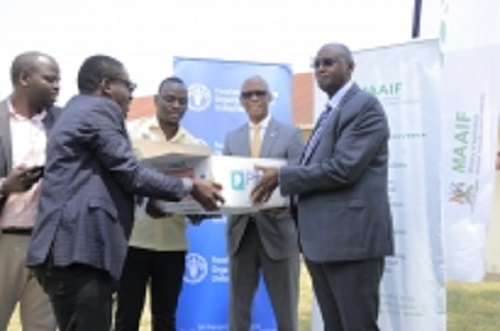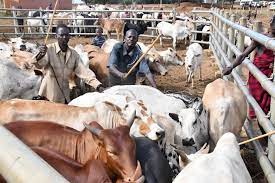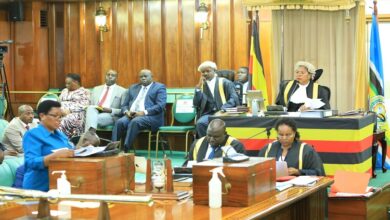FAO donates livestock vaccines to Karamoja and Elgon regions

Kampala, October 16, 2023 –The Food and Agriculture Organisation of the United Nations [ FAO ] recently donated an assortment of livestock vaccines worth US$1 million to the Ministry of Agriculture, Animal Industry, and Fisheries [MAAIF] to fight the spread of transboundary diseases and zoonoses in Karamoja, and the Elgon regions.
The vaccines donated include 140,000 doses of Foot and Mouth disease [FMD] vaccines, 110,000 doses of Contagious Bovine Pleuropneumonia [CBPP], 300,000 doses of Contagious Caprine Pleuropneumonia [CCPP], 200,000 doses of Sheep and Goat pox [SGPox] 400,000 doses of Peste des Petits Ruminants [PPR], and 183,000 doses of anthrax & black quarter combined vaccines.
According to the officials, the vaccines and related essential resources, including equipment, reagents, are vital components in the ongoing efforts to combat transboundary animal diseases through the ongoing three-month vaccination exercise.
The vaccines will be used for an anticipatory action in Karamoja, informed by early warning information, to protect livestock against FMD, CBPP, CCCP, SGP, and PPR. At the same time, anthrax vaccination in Mt. Elgon is an emergency response to outbreaks in the region.
Officials observed that animal diseases can devastate livestock production value chains and livelihoods, and some can pose a risk to human health, especially in Karamoja, where more than 70 percent of households depend on livestock.
The diseases, officials said are mainly of transboundary in nature and have the potential to restrict livestock and livestock products from accessing lucrative export markets, thereby undermining farmers’ incomes.
“FAO is committed to supporting Uganda in its efforts to control these diseases,” said Antonio Querido, FAO Representative in Uganda, at the handover ceremony held at the National Animal Disease Diagnostics and Epidemiology Centre [NADDEC].
“The donation of these vaccines is a concrete example of our commitment, and we are confident that it will significantly improve animal health and welfare in the targeted regions where a significant percentage of households depend heavily on livestock.”
Dr Antonio said that FAO believes that vaccines and vaccination are proactive measures that should be applied before disease outbreaks and will continue to support government efforts to implement anticipatory actions such as vaccination based on early warning information.
The donated vaccines will be administered to animals in both Karamoja and Mount Elgon region, collaborating with MAAIF, and District Local Government (DLGs)s. “FAO will also provide technical support to ensure the vaccines are administered effectively and diseases burdens impacted by these diseases on livestock value chains and human health are significantly minimised.”

“We are grateful to FAO for this generous donation of vaccines,” said Bright Rwamirama, Minister of State for Animal Industry. “These vaccines will help us protect our livestock from deadly diseases and improve our farmers’ livelihoods, which, in turn, will boost food security, improve market access, and the economic well-being derived from livestock farming.”
“The ongoing livestock vaccination is part of FAO’s broader support to Uganda’s livestock sector. FAO is working with MAAIF and other partners to improve animal health and welfare through supporting livestock disease surveillance to generate early warning information on livestock diseases, supporting the adoption of sustainable livestock management climate-smart practices, among others, all aimed at increasing livestock production and productivity.”
The livestock industry in Uganda plays a crucial role in household nutrition and income levels. It also significantly contributes to the country’s agricultural Gross Domestic Product (GDP), accounting for 6.5 percent.
Minister Rwamirama noted that the continued threat of animal diseases impedes the growth and competitiveness of the country’s livestock industry and affects the export value of select agricultural commodities, including milk and beef, derived from livestock.
Buy your copy of thecooperator magazine from one of our country-wide vending points or an e-copy on emag.thecooperator.news







